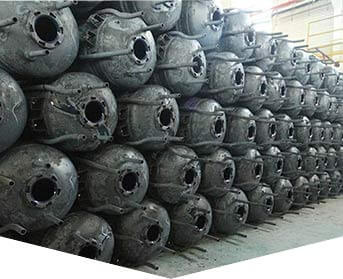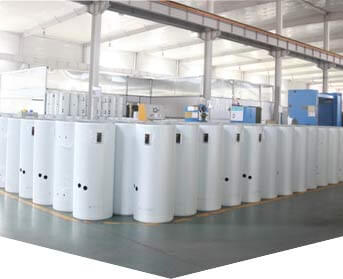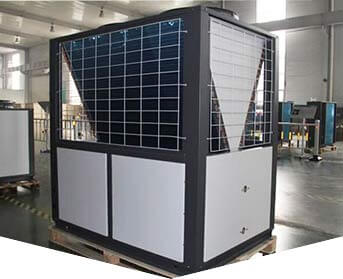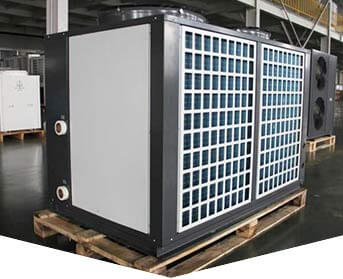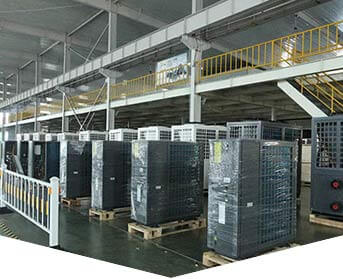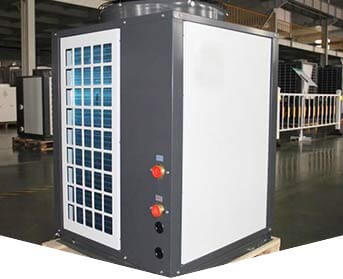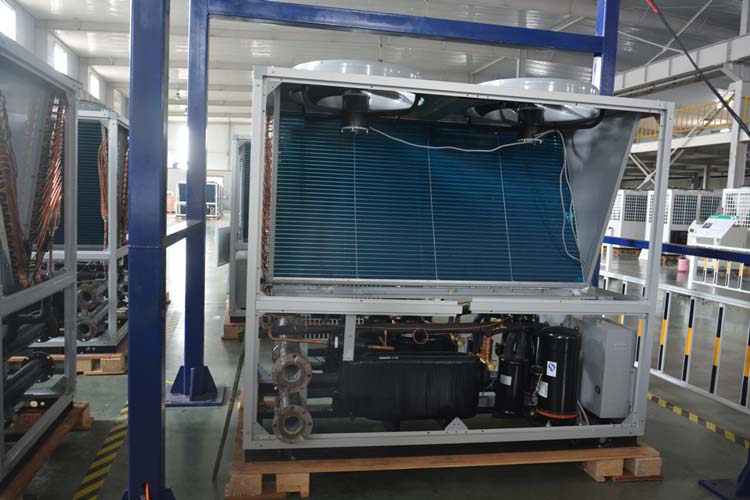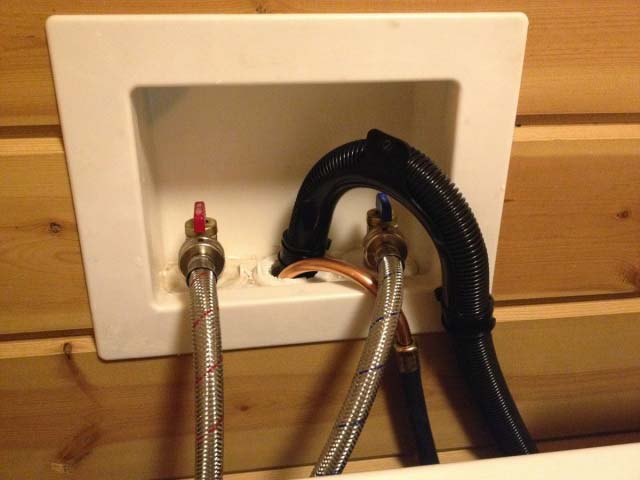Water Source Heat Pumps
MLT is one of the professional manufacturer of Water Source Heat Pumps, Geothermal water to water heat pumps, Ocean Water Source Heat Pump, waste Water Source Heat Pumps.
- 20+ years of manufacturing experiences of Water Source Heat Pump.
- Up to 5+ years of warranty on all Water Source Heat Pump.
- 100% Testing on all our Water Source Heat Pump before delivery.
- Fast delivery, 3-4 weeks production time upon receiving your bulk orders.
- MLT is one of your best Water Source Heat Pump suppliers in China.
- We accept OEM & OEM orders all our our heat pump products.
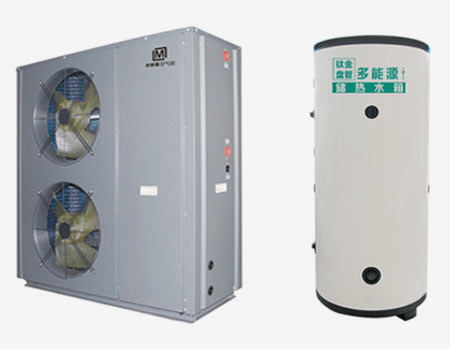
Custom Your Water Source Heat Pump
MLT is professional in manufacturer of Water Source Heat Pump with themself R&D technology team more than 20 years.
All buffer tanks can be customized by your requirements, we can supply the Water Source Heat Pump design and suggestion for your Water Source Heat Pump before our co-operation, and we can supply our technical support with free installation services after we cooperation.
Our engineer can design and provide energy solutions of buffer tanks for you with the reasonable price, and we can do OEM & ODM Service for your Water Source Heat Pump requirements.
We can arrange fast shipment of Water Source Heat Pump for you, as our staffs have more than 15 years working experience in their professional field, and we always stock some regular Water Source Heat Pump in our warehouse.
Contact Our Support Team
Water Source Heat Pump
Introduction
What is the current temperature in your room?
Is it too cold, too warm or does it fall in between there?
Are you satisfied with the current room temperature? If not, what are you doing about it?
Do you know that it is possible to regulate the room temperatures?
Well, when we mention the word room temperature, we can guess the thing that is your mind:
HVAC.
Nobody can deny the fact that HVAC systems are good temperature regulators.
But, what if there are better alternatives? Will you stick to the traditional methods of regulating heat?
Maybe you have ever heard of heat pumps.
Without taking you through circles, just imagine of having an alternative way of transferring heat in a room.
Yes, think of the capabilities of heating up your room without spending lots of money.
Wouldn’t your life be much better?
Well, this is what heat pumps promise to do.
Would you like to know more about heat pumps?
Stay put and read this ebook to the end.
- What is heat Pump
- Types of Heat Pumps
- Should I Install Water Source heat pumps?
- How does Water Source heat pumps work
- The cost of Installing Water Source heat pumps
- Things to Consider when choosing a Water Source heat pumps
- Water Source heat pumps Troubleshooting and Repair
- How to choose Water Source heat pumps Manufacturers
- Conclusion
It is going to enlighten you about everything that you need to know about heat pumps.
Chapter 1: What is a Heat Pump
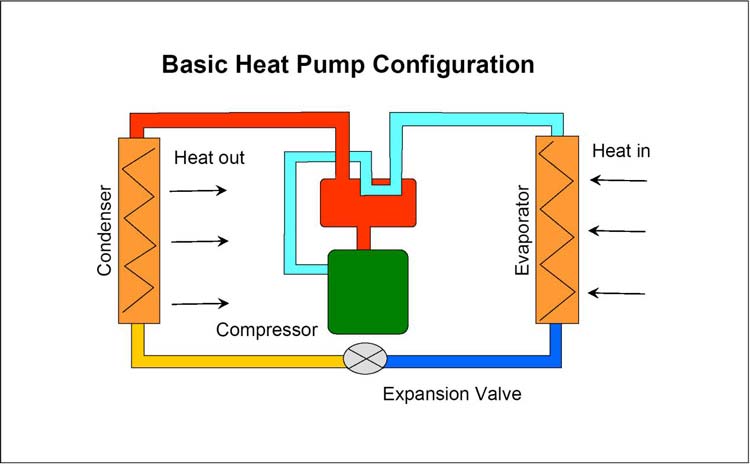
Heat pump diagram courtesy Alaska Energy
To start us off, here is the heat pump definition.
Simply put,a heat pump is basically a device that transfers heat energy from a source to a desired location.
The pump utilizes both the electronic and mechanical means to transfer the heat.
There is one outstanding thing that you need to know about a heat pump.
It transfers thermal energy opposite to the direction of the source.
What are the heat pump thermodynamics?
Well, a heat pump works in a similar manner to a refrigerator.
It also uses electric energy to pump heat from a cool zone to a warmer zone.
What does this mean?
It simply means that a heat pump makes a warm place warmer and a cool space cooler.
So, we can confidently say that a heat pump uses the refrigeration-type cycle.
The only difference is this cycle is directed to the opposite direction.
But, there is one more difference.
Instead of releasing the heat to the surrounding environment, it releases to a conditioned environment.
One question that you may be asking yourself is:
What are the real-life examples of heat pumps?
Well, we will always compare heat pump vs air conditioner.
These are devices used for heating and cooling rooms.
Are heat pumps the same as electrical resistance heaters?
No. There is a big difference between these two types of devices.
However, the major difference is in terms of efficiency.
Using the same electricity, heat pumps can deliver four times better performance than the electrical resistance heaters.
Chapter 2: Different Types of Heat Pumps
You now understand what a heat pump is and the things that it can do.
The next important thing that you need to know is the different types of heat pumps.
Are you planning to buy a heat pump for your home?
It is important that you get the right device that will do the job.
Here are the main types of heat pumps that you should know:
2.1. Geothermal Heat Pumps
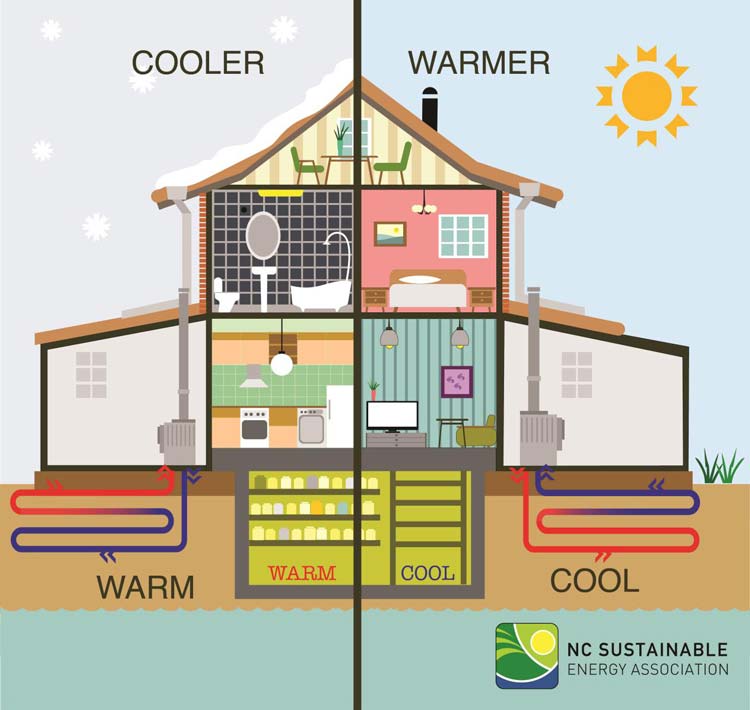
Courtesy Energy NC
From the word “Geo”, you can easily tell where we are heading to.
You are right, Geothermal heat pumps (GHPs) use the temperature from the earth as their means of exchange.
To be frank, these types of heat pumps are ranked among the oldest.
You won’t believe that they have been existence since 1940s.
After all, the heat from the earth has always been there since the existence of the universe.
If you are torn between geothermal and other heat pumps, there is one feature that will attract you to this type.
They are silent.
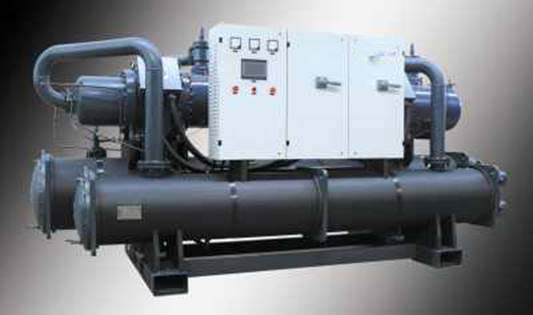
Geothermal Heat Pumps
You can use this type of heat pump without worrying about any noise levels.
Just check on the geothermal heat pump reviews.
You will discover that silent is the most-talked attribute of these systems.
Still, there are different types of geothermal heat pumps that you need to know.
They include:
-Horizontal
-Vertical
-Pond
-Open-loop
-Hybrid systems
Are there any differences between the above heat pumps?
Each type of the above geothermal heat pump system is designed to function in a specific way.
Do you have more space than what you need?
Consider installing a horizontal heat pump.
It is also an ideal option if you want to cut down the cost of installation.
Are you limited in terms of the availability of space?
Vertical heat pumps should be your number one choice.
They occupy a very minimal ground surface area.
This explains why they are preferred by large institutions such as schools.
Perhaps you would like to ask this question.
What is the difference between open-loop and closed loop systems?
Well, the answer to this question is quite simple.
In a closed loop, the antifreeze solution is passed through a closed loop that has been dug underground and submerged through in water.
On the other hand, an open-loop uses a large water body as a medium of heat exchange.
There is one more type of geothermal heat pump that you ought to know.
It is known as hybrid systems.
These heat pump combines the features of geothermal and air cooling tower.
The exchange of heat between GHP and the earth is facilitated by a heat exchanger.
But, what can a geothermal heat pump system do?
Well, a geothermal heat pump manufacturers design these systems to work just like any other heat pump.
It is capable of heating and cooling a room.
2.2. Water Source Heat Pumps
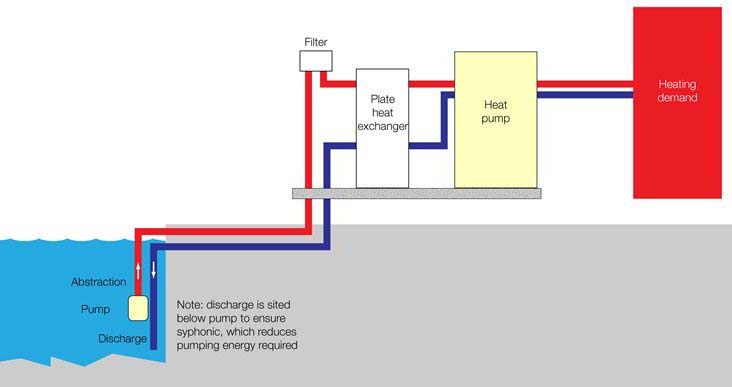
Courtesy CIBSE
To start us off is the water source heat pump definition
What are water source heat pumps?
Just from the name, are you able to tell why they are known as known as water source pumps?
Well, we will put some efforts to explain you.
These types of pumps dissipate heat using water.
Such a pump transfers heat from a water source directly to your household.
Sounds ambiguous and impossible. Right?
To be honest, such water pumps are impossible to install in most residential areas.
They require large water bodies such as rivers or streams.
But, what if you live close to such water sources?
Nothing should hinder you from installing such a pump in your home!
These pumps work to the optimum levels when the temperature range is between 5-9 degrees Celsius.
What is more surprising:
Water pumps have been in the market since 1940s.
Are water source heat pumps any way better?
There are various ways of answering this question.
If you are an environment-conscious person, the answer will be yes.
The main reason for this answer is this:
Water source pumps release less CO2 than most conventional heating systems.
There are also there different types of water source heat pumps.
These are closed loop system, open loop system and hybrid system.
2.3. Air Source Heat Pump
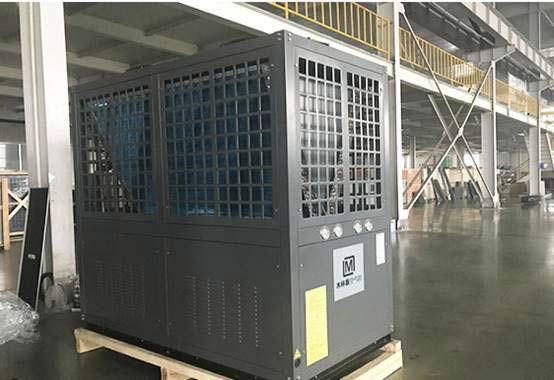
Air Source Heat Pump
You may also consider installing an air source heat pump to heat and cool your home.
But, how does it perform?
In terms of the performance, you don’t need to worry much.
It can dissipate up to three times more heat energy than the conventional heat systems.
And there is more to that.
It consumes less amount of electricity power to achieve amazing results!
It is also glad to note that there has been a lot of technological advancements that have been done on air source heat pumps.
They can now be used anywhere.
Even if you are living in a cold area, it is still possible to use them.
Before you make that critical decision:
To purchase an air source heat pump, it is important to know that they come in different types.
Let’s highlight the common types of air source heat pumps that you should know:
- Ductless and Ductedand Short-run Ducted;
These three types of air source heat pumps are somehow related.
You may need to be a little bit attentive when choosing them.
The main reason that can motivate you to get a ductless system is it has minimal construction.
You only need to drill three holes through your wall.
On the other hand, ducted heat pumps simply have ductwork.
For this reason, you need to construct a functional ventilation system.
Short-run ducted have a ductwork that runs through a small section of the house.
- Split and Packaged Heat Pumps
What is the difference between these two types of air heat pumps?
Well, you can easily identify split systems by their single coil inside and another one outside.
Their connect and supply ducts connect to the indoor central fan.
For packaged systems, both the coils and fan are on the outdoors.
- Multi-zone and Single-Zone
The difference between these two is quite simple and clear.
Single-zone systems are specially designed for a single room that has one outdoor condenser that is to be connected to a single indoor head.
On the other hand, you can connect multi-zones to more than one indoor heads and condensers.
So, which type of air heat pump do you think will suit you?
2.4. EVI Heat Pump
First things first, what does EVI stand for?
EVI simply stands for Enhanced Vapor Injection.
It is designed to deliver superior performance in places that receive less temperature.
There is a special feature about these heat pumps:
It has an extra heat exchange plate known as “Economizer”.
This technology allows a robust delivery of heat energy.
This is why the are usually referred to as cold climate heat pump.
Why should you buy EVI heat pump?
You can be sure of enjoying at least 30% efficiency than the traditional heat systems.
2.5 DC Inverter Heat Pump
Simply put, the DC inverter heat pump rides on the inverter technology (DC).
Probably you want to know how it operates.
The inverter in this heater is used to control the speed of the compressor motor.
In doing so, it regulates the temperature of the room.
The most amazing thing that you will love is the control feature.
DC Inverter Heat Pump will give you total control.
You can easily control its great-regulating functions.
The heat pumps also performs quite well in terms of the performance.
2.6. Swimming Pool Heat Pump
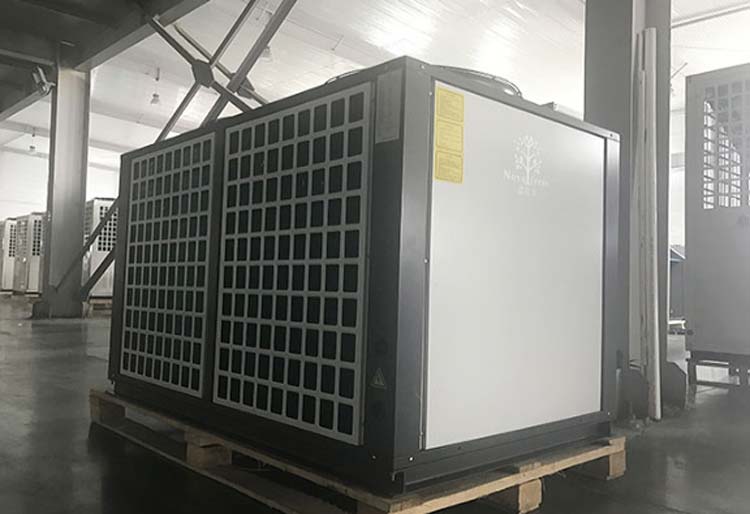
Swimming Pool Heat Pump
Spending time in a swimming pool is enjoyable on its own.
It is more interesting if you can control the water temperature of the swimming pool.
The good news:
You can do that using swimming pool heat pump.
Imagine being in swimming pool during a cold night.
Sounds amazing, right?
A swimming pool heater collects heat from the environment.
Using various mechanisms, this heat is distributed in the water.
It ends up making your water warm!
This means one thing:
You will be able to use your swimming pool all-year round.
The freezing temperatures won’t be enough to scare you.
Are you looking for heat pool pump for sale?
Just check out on the internet for pool heat pump reviews
2.7. Residential Heat Pump
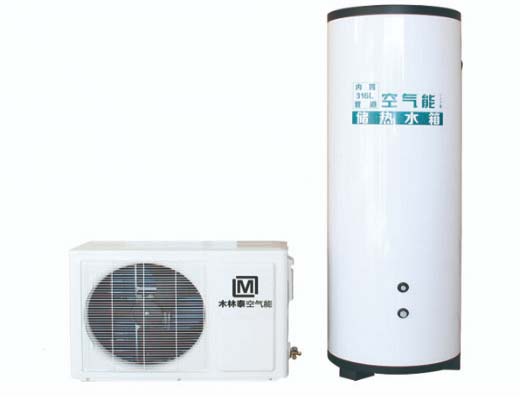
Residential Heat Pump
Do you want to install a residential heat pump at your home?
Well, there are different types of residential heat pumps.
Here are some of them:
2.7.1 Split Heat and Water Heater
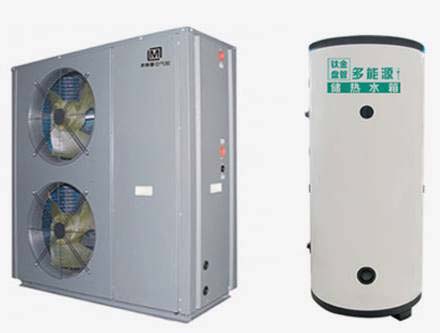
Split Heat and Water Heater
We can this type of residential heat pumps as air-to-water heat pump.
The reason for such a brief definition is quite simple.
The extract heat from air and dissipate it in water which is stored in an insulated tank.
More powerful versions of these heat pumps extract heat from outdoor air rather than indoor air.
2.7.2. All in One Heat Pump
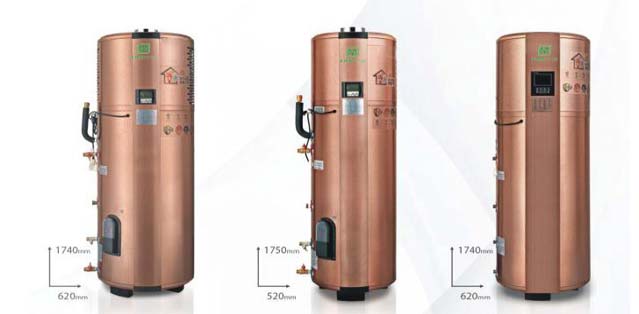
The name sounds pretty amazing, right?
True, this heat pump lives up to its name.
It delivers an all-round performance.
The refrigerant in a all All-in-One Heat Pump transfers heat through a heat exchanger.
This exchanger is wrapped around the tank.
The refrigerant supplies the heat via conduction. The heat pump is positioned on top of the tank.
This heat pump has separate plumbing connections for both cold and hot water.
It is very easy to install an All-in-One heat pump at your home.
2.7.3 High Temperature Heat Pumps
Let’s assume that you already have a building and it has few heat emitters.
You want to install a heat pump.
But, you don’t want to renovate your house.
What should you do?
High Temperature Heat Pump seems to have a perfect solution for such an issue.
It is best suited for buildings that have limited heat emitters.
If you don’t want to refurbish your home or do any kind of renovation, this is the heat pump to get.
What about the performance?
High temperature heat pump is capable of raising the temperatures up to 80 degrees celsius.
It also gives you full control.
You can easily regulate the performance of this heat pump.
2.7.4 Heat Pump Dryer
After some laundry tasks, you would like your clothes to dry faster.
Heat pump dryer is an effective device that can do this job perfectly.
It acquires heat directly from the heat pump and uses it to dry clothes.
You will still be comfortable with this device as it is ventless.
This means that it requires very few penetrations in order to be sealed.
Are heat pump dryers worth it?
Yes. They are worth spending your money on.
Before buying one, it is important to read heat pump dryer reviews
Chapter 3: Should I Install Water Source Heat Pumps?
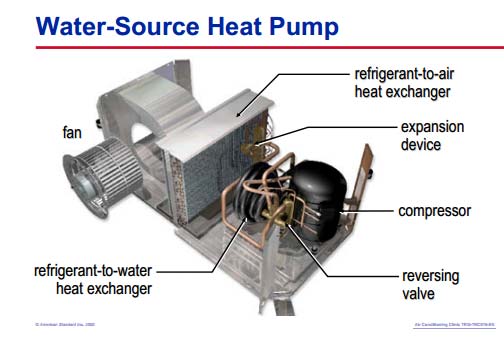
Courtesy Appliance Standard Awareness Project
Is it worthy to install a water source heat pump?
You are asking this question because these devices have evoked some interest in you.
Of course, the answer is yes.
To give you a clearer picture, we are going to organize our answers structurally.
3.1. Advantages of a Water Source Heat Pump
By now, you know what a water heat pump is.
You have even decided that it is the heat pump that you are going to buy.
It’s time to understand the benefits that you can get from installing it at your home.
This subsection of this chapter is going to focus on the benefits that you can gain from installing a water heat pump.
-They generate less CO2 emission.
Are your keen on saving the environment?
This point may excite you to some great extent
Water source heat pumps emit less carbon dioxide.
This simply means that they are safe to the household and environment in general.
– They are cost saving
If you have been planning to cut down on the cost of electricity bill, here is a solution for you.
Water source heat pumps are energy-efficient.
They properly utilize the little energy that is available.
To prove this:
Just replace your conventional heating system with water source heat pump.
Do not be surprised if you end up saving up to 30% of the electricity bill.
-Access to large volumes of water
If properly engineered, water source heat pumps can extract heat from large water bodies.
Disadvantages of Water Source Heat Pumps
Well, all is not that rosy.
You can also experience the misgivings of water source heat pumps.
Let’s highlight some of them:
-Some types of water source heat pumps are too hectic to install.
One perfect example is the open loop water source heat pump.
-Contaminated water
Well, maybe you saw this coming.
We will again use the open loop water source heat pump as an example.
The water that acts as a source of heat is always left open.
This means that;
It is exposed to dirt and debris.
More electrical energy may be needed to pump such water.
-Fluctuating water supply
Let’s assume that you are depending on a nearby river for water.
The changing seasons can affect the reliability of that water.
For instance,
You won’t be able to use it during a freezing winter.
The table below gives a clearer picture of the pros and cons of a water source heat pump:
| Advantages | Disadvantages |
| -Highly energy efficient -Delivers maximum levels of heat -Cost effective -Access to large volumes of water | -High risk of contamination -Affected by fluctuating water temperature |
3.2 Efficiency of Water Source Heat Pumps
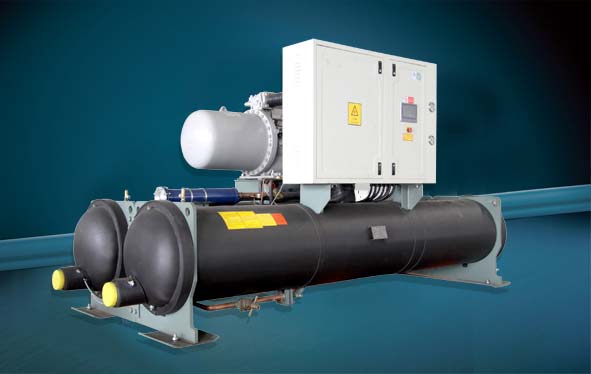
Are water source heat pumps efficient?
In terms of the performance, these devices are highly efficient.
They can give you results of up to 300% to 600% during cold nights.
Definitely, this is too much than what you can get from conventional heating units.
Chapter 4: How Does a Water Source Heat Pump Work?
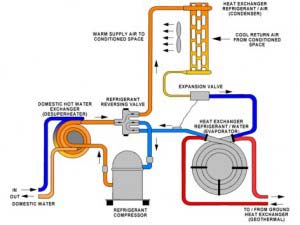
Courtesy: AIA Monterey Bay
It doesn’t hurt to know how your water source heat pump works.
From the image, you can see water source heat pump design.
Lets elaborate the working mechanism of this device.
A water source heat pump consists of reverse cycle heat pump units.
These units are connected to each other by a loop.
Each unit is designed to meet specific requirements for the efficient delivery of heat.
When the weather is cold or chilly, the pump transfers heat from the loop via a refrigerant.
This heat is then directed to the air.
During hot days, the units in the water source heat pump operate in the heating mode.
Heat is directly supplied from the water.
A fluid heater is installed in the loop so as to bolster the heating process.
You see:
There is always a need to improve the efficiency of the whole heating process.
One way of doing this is by choosing the right location.
Ensure that the water source is near your house.
This simply means that less amount of energy will be used to pump water.
Instead, more of it will be channeled towards generating heat.
However:
If the water source is some distance away from your home, use pipes with large diameters.
Here is a graphical representation of how a water source heat pump works.
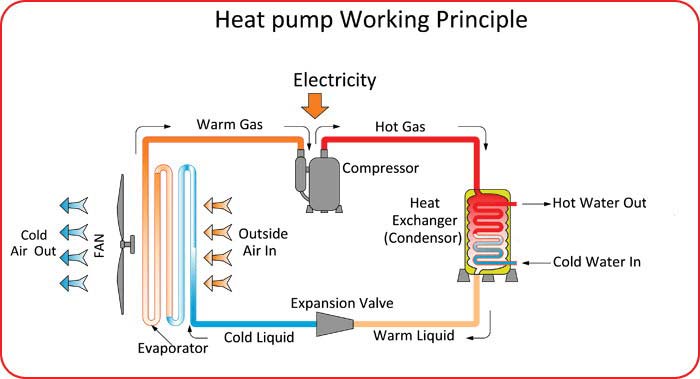
Heat Pump Working Principle
Take note:
Seek permission from relevant authorities before commencing with the project.
Ensure that you have papers allowing you to do the source.
Chapter 5: The Cost of Installing Water Source Heat Pump
You are now set to get the water source heat pump.
But, wait..
There is something that we have not talked about.
The cost of water source heat pump!
How much will it cost to install a functional water source heat pump?
Stay put.
We are going to do a comprehensive price breakdown of the the water source heat pump.
The initial cost of purchase:
You will spend approximately $15, 000 to install a complete water source heat pump.
The figure seems to be too high, right?
In fact, it is pricier than most conventional heating systems.
However, you shouldn’t be scared of this figure.
Although the initial cost of installation is high, you will end up saving on the cost of using the device.
The water source heat pump has a low operation cost.
What would you prefer?
Would you rather spend less to purchase but end up paying exorbitant fees in the long run?
Make a wise and noble decision.
What are the running costs of the water source heat pumps?
Honestly, there is no specific amount that you will pay.
Various factors can have an impact on the final impact.
You ad your neighbor may be having the same model of water source heat pump.
Despite of the close similarity, you may still end up paying higher or lower than him.
The good news is we won’t leave you in darkness.
We will still give you some estimates on the amount that you should pay.
Basically, there are three main factors that determine the running costs of a water source heat pump.
These are:
-The size of the property and its energy requirements
-The operating efficiency of a water source heat pump
-The temperature of the energy source
The above three factors are self-explanatory in nature.
Aren’t they?
Let’s take for instance the size of the property.
Logically, you should pay more when using the heat pump on a large house.
There is one more factor that we cannot ignore:
The desired output temperature.
What is the difference between your indoor and outdoor temperatures?
If the gap is very wide, prepare to pay more.
Otherwise;
You will just pay an average or lower price.
There is one commonly ignored factor that can force you to pay high costs.
This is: faulty installation.
What is the state of your property?
Is it in a good condition?
Ill suited properties can also raise the running costs of water source heat pumps.
In overall,the running cost of water source heat pumps is relatively lower.
Chapter 6: Things to Consider When Installing Water Source Pump
You are almost there.
You are now ready to purchase the water source heat pump and bring to your property.
What should you do?
Don’t be in any hurry to bring the new water source heat pump.
You may end up making a big mistake that you will regret for years.
If you want to be safe, create checklist.
Your checklist should contain the following items:
6.1. Planning Permissions
A water source heat pump is a major installation.
It can affect you and the people living around.
Seek the approval of the various authorities before proceeding with your plan.
This may sound as a minor issue, right?
Well, ignore it at your own peril.
You don’t want to see your project being demolished due various reasons.
Among them is:
Lack of relevant papers.
6.2. The heating system
So, which heating system are you using or planning to use?
Do you prefer large radiators or do you use low temperature fan convectors?
You should consider getting low temperature fan convectors.
They simply match with water source heat pumps.
Of course, there are many other reasons for using these type of heating systems.
6.3. Home Insulation
What is the general condition of your house?
Are there cracks and crevices on the walls?
Keep in mind that you need to conserve every heat energy that gets into the house.
There should be minimal wastage.
Give your home maximum levels of insulation.
6.4. Your heating fuel
What type of fuel are you using to heat up your home?
Is it oil, gas, electricity or solar?
Let’s assume that you are financially savvy.
Try to compare the financial constraints of the water source heat pumps with your current heating fuel.
How do they compare?
Will the water source heat pump be cheaper or will you pay more?
Let your financial analysis focus on the long-term goals.
6.5. Ongoing construction activities
There is one thing that you can’t deny:
Installing a water source heat pump is a hectic process.
You will be forced to destroy and at the same time rebuild parts of your house.
Is there an ongoing construction that you are undertaking?
Take advantage of the situation to incorporate the installation process.
In doing so, you will be able to cut down on the cost of installing a water source heat pump.
Chapter 7: Water Source Pump Troubleshooting, Repair and Maintenance
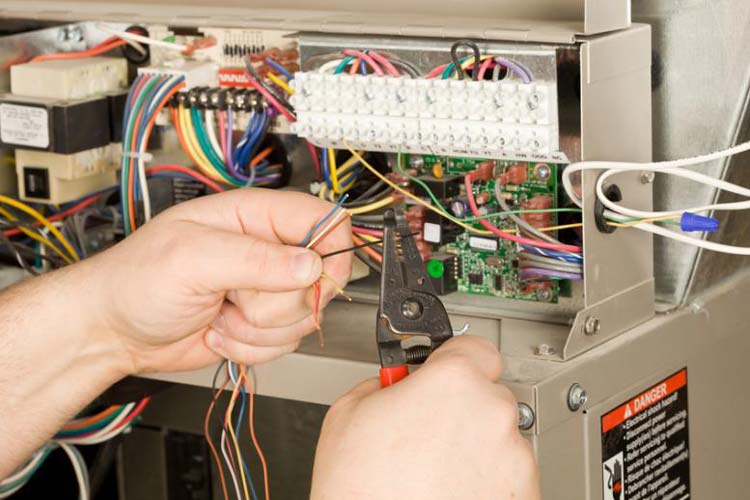
Courtesy Xstreem Air Services
7.1. Water Source Heat Pump Troubleshooting
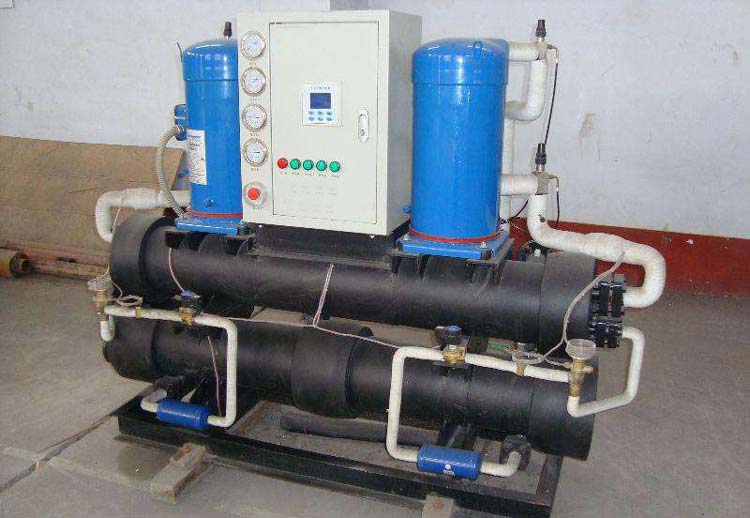
Water Source Heat Pump Troubleshooting
My water source heat pump is malfunctioning.
It is not delivering the heat as expected.
Perhaps it has even stopped functioning completely.
What should I do?
Calling a technician is an obvious option.
But before you pick that call, consider doing it yourself.
The problem may be too small and you can handle it.
Here are some useful guides for troubleshooting a water source heat pump:
7.2. The eater source heat pump is not running.
-Check and see if it is connected to the power source.
-Ensure that the thermostat is set correctly
-Check to ensure that the power cables are okay.
7.3. Water source heat pump does not heat or cool correctly
-Check if the thermostat is set correctly
-Inspect the heat pump filters. Clean them if they are dirty.
-Ensure that the auxiliary heating elements are working properly
-Try to clean the coils
7.4. Water source heat pump freezes up
This issue is always caused by an extremely cold temperatures (https://www.hometips.com/repair-fix/heat-pump-cold-weather-problems.html).
It makes the condenser of the heat pump to freeze hence stop working.
What should you do?
Start by turning the system off.
Next try to unclog the filter.
7.5. The heat pump produces unusual noises
There is a standard sound that your water source heat pump should produce.
Right?
Grinding and squealing sounds are indicators of a potential problem.
Is your water source heat pump producing any sound?
The most immediate measure that you should take is to shut off the system.
In case there are some rattling sounds, tighten the screws.
What if the sounds persist?
Call a professional water source heat pump technician.
7.6. Water Source Heat Pump Maintenance Tips
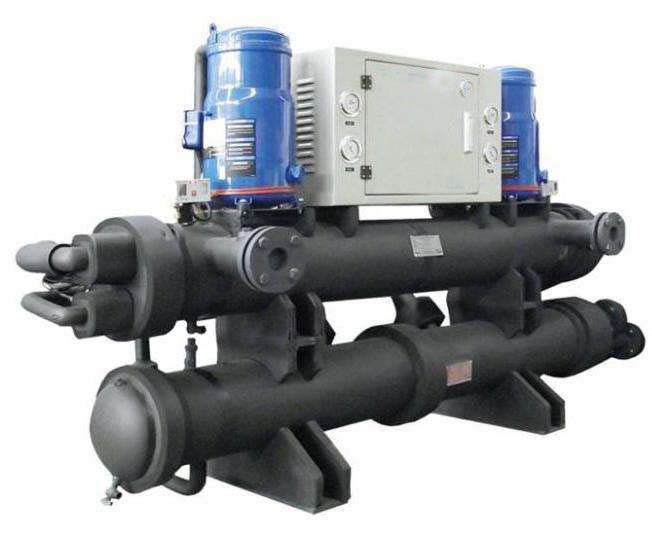
Source: MLT Heat Pump
Do you want your water source heat pump to always remain in a perfect shape?
Try to implement the following tips:
-Always clean the coil regularly
-For the filters, try to clean and unclog them ate least on a monthly basis
-Lubricate the fan motors when necessary
For complex repair and maintenance issues, seek professional help.
Handling some issues on your own can complicate matters.
You may end up causing more damage hence increasing the repair cost.
Chapter 8: How to Choose Water Source Heat Pump Manufacturer
How do you get the best water source heat pump manufacturer?
With plenty of manufacturers seeking for your attention, making a definitive choice won’t be a walk in the park.
This doesn’t mean it is an impossible task.
You can still make the right choices.
Here are the best guidelines that you can use to choose the best water source heat pump manufacturer:
8.1. License:
Is the company licensed to manufacture heat pumps?
If not, take a dash to the next company
8.2. Experience
How many years has the manufacturer been on the business?
If you want quality water source heat pumps, choose an experienced manufacturer.
8.3. References and Referrals
Does the company have a list of its former customers?
Do not be afraid to ask them for this list.
Ask those customers about their views on the company.
8.4. Check online reviews of the Water source heat pump manufacturer
Use the internet to your own advantage.
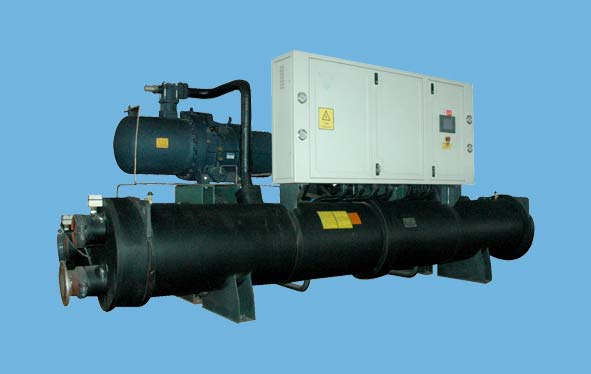
Source: MLT Heat Pump
See what other people are saying about a water source heat pump manufacturer.
Does it have positive reviews?
If the answer is yes, consider working with it.
Avoid manufacturers with negative reviews.
Conclusion
Well, much has been said about heat pumps and water source heat pumps cost.
The final decision boils down to you.
Are you looking for the best heat pump
This guideline will is resourceful enough to help you make a wise decision.
References
- Water Source Heat Pump Cost(https://www.greenmatch.co.uk/heat-pump/water-source-heat-pump/water-source-heat-pump-cost)
- Heat Pump repair and Troubleshooting (https://www.hometips.com/repair-fix/heat-pump-cold-weather-problems.html)
- Water Source heat Pumps (https://www.icax.co.uk/Water_Source_Heat_Pump.html)
- Water Source Heat Pumps Advantages and Disadvantages (https://www.renewableenergyhub.co.uk/heat-pumps-information/water-source-heat-pump.html)
- Heat Pump Systems: Buyers Guide (https://www.energy.gov/energysaver/heat-and-cool/heat-pump-systems)

